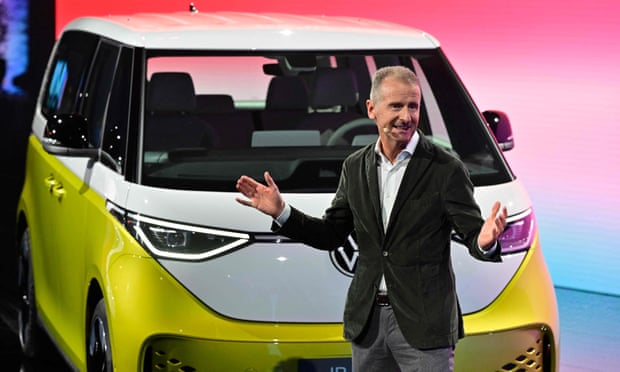VW boss Herbert Diess exits three years early after turbulent tenure
Porsche’s Oliver Blume will take over after difficulties managing electric transition during Diess’s four years in charge

Volkswagen’s CEO, Herbert Diess, is stepping down and will be succeeded by the current head of Porsche, Oliver Blume, Europe’s top carmaker has said, after a four-year tenure in which Diess pushed VW’s electric vehicle ambitions and clashed with its work council and board.
Sources with knowledge of the matter said the Porsche and Piëch families, who own over half the voting rights and a 31.4% equity stake in Volkswagen, pressed for a change at the helm.
“Diess was incorrigible. He significantly changed Volkswagen for the better. But his communication was miserable,” one source said, asking not to be named.
Diess will leave his role on 1 September, three years before the end of his contract in 2025.
Blume, at VW Group since 1994 and chair of Porsche’s board since 2015, will retain his position at Porsche alongside his new responsibilities “including in the event of a possible [stock market flotation]”, a statement said.
Diess’s future at Volkswagen has been in doubt after communication missteps which angered the workers’ council, most recently in autumn last year after he stated a mismanaged transition to electrification could cost the carmaker more than 30,000 jobs. He was also lambasted for his frequent public warnings that Volkswagen was falling behind Tesla.
The instability weighed on Volkswagen’s market value, which has been on a downward spiral since early 2021.
Daniela Cavallo, chair of the workers’ council, had warned that support for the extension of Diess’s contract would depend on whether he could keep Volkswagen at the forefront of Europe’s car industry.
In what could be taken as a warning to Diess’s successor, Cavallo said in a statement on Friday that “job security and profitability” are “equally important”.
In Europe, Volkswagen is ahead on electric vehicle (EV) sales, with roughly 25% of the market share compared with Tesla’s 13%.
But whether it will remain in first place is unclear, with its production times for an EV currently three times longer than Tesla’s and a new electric-only factory not expected to open until 2026.
The German carmaker has struggled in particular with progressing on software, with its two-year-old software unit, Cariad – which Diess took responsibility for on the board in December – far exceeding its budget and years behind on the target of a more developed software platform.
Executives have pegged a possible float of Porsche in the fourth quarter as a means to fund Volkswagen’s makeover as an electrification-oriented carmaker spanning software, batteries and cars, though poor market conditions mean a listing could bring in billions less than originally hoped.
Diess, in a LinkedIn post before Friday’s announcement of his departure, said: “After a really stressful first half of 2022, many of us are looking forward to a well-deserved summer break.”
Diess, a native of Bavaria in southern Germany, joined Volkswagen from BMW in July 2015, just months before news broke that VW had cheated emissions tests in the US.